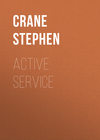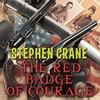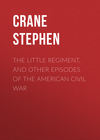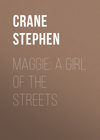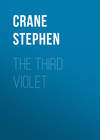Читать книгу: «Active Service», страница 10
CHAPTER XVII
" Come out on the balcony," cooed Nora. "There are some funny old storks on top of some chimneys near here and they clatter like mad all day and night."
They moved together out to the balcony, but Nora retreated with a little cry when she felt the coldness of the night. She said that she would get a cloak. Coleman was not unlike a man in a dream. He walked to the rail of the balcony where a great vine climbed toward the roof. He noted that it was dotted with. blossoms, which in the deep purple of the Oriental night were coloured in strange shades of maroon. This truth penetrated his abstraction until when Nora came she found him staring at them as if their colour was a revelation which affected him vitally. She moved to his side without sound and he first knew of her presence from the damning fragrance. She spoke just above her breath. "It's a beautiful evening." " Yes," he answered. She was at his shoulder. If he moved two inches he must come in contact. They remained in silence leaning upon the rail. Finally he began to mutter some commonplaces which meant nothing particularly, but into his tone as he mouthed them was the note of a forlorn and passionate lover. Then as if by accident he traversed the two inches and his shoulder was against the soft and yet firm shoulder of Nora Black. There was something in his throat at this time which changed his voice into a mere choking noise. She did not move. He could see her eyes glowing innocently out of the pallour which the darkness gave to her face. If he was touching her, she did not seem to know it.
"I am awfully tired," said Coleman, thickly. "I think I will go home and turn in."
" You must be, poor boy," said Nora tenderly.
"Wouldn't you like a little more of that champagne?"
" Well, I don't mind another glass."
She left him again and his galloping thought pounded to the old refrain. " To go to the devil-to go to the devil-to go to the devil with this girl is not a bad fate-not a bad fate- not a bad fate." When she returned he drank his glass of champagne. Then he mumbled: " You must be cold. Let me put your cape around you better. It won't do to catch cold here, you know."
She made a sweet pretence of rendering herself to his care. " Oh, thanks * * * I am not really cold * * * There that's better."
Of course all his manipulation of the cloak had been a fervid caress, and although her acting up to this point had remained in the role of the splendid and fabulous virgin she now turned her liquid eyes to his with a look that expressed knowledge, triumph and delight. She was sure of her victory. And she said: "Sweetheart * * * don't you think I am as nice as Marjory ?" The impulse had been airily confident. It was as if the silken cords had been parted by the sweep of a sword. Coleman's face had instantly stiffened and he looked like a man suddenly recalled to the ways of light. It may easily have been that in a moment he would have lapsed again to his luxurious dreaming. But in his face the girl had read a fatal character to her blunder and her resentment against him took precedence of any other emotion. She wheeled abruptly from him and said with great contempt: " Rufus, you had better go home. You're tired and sleepy, and more or less drunk."
He knew that the grand tumble of all their little embowered incident could be neither stayed or mended. "Yes," he answered, sulkily, "I think so too." They shook hands huffily and he went away.
When he arrived among the students he found that they had appropriated everything of his which would conduce to their comfort. He was furious over it. But to his bitter speeches they replied in jibes.
"Rufus is himself again. Admire his angelic disposition. See him smile. Gentle soul."
A sleepy voice said from a comer: " I know what pinches him."
" What ? " asked several.
"He's been to see Nora and she flung him out bodily."
" Yes?" sneered Coleman. "At times I seem to see in you, Coke, the fermentation of some primeval form of sensation, as if it were possible for you to de- velop a mind in two or three thousand years, and then at other times you appear * * * much as you are now."
As soon as they had well measured Coleman's temper all of the students save Coke kept their mouths tightly closed. Coke either did not understand or his mood was too vindictive for silence. " Well, I know you got a throw-down all right," he muttered.
"And how would you know when I got a throw down? You pimply, milk-fed sophomore."
The others perked up their ears in mirthful appreciation of this language.
" Of course," continued Coleman, " no one would protest against your continued existence, Coke, unless you insist on recalling yourself violently to people's attention in this way. The mere fact of your living would not usually be offensive to people if you weren't eternally turning a sort of calcium light on your prehensile attributes." Coke was suddenly angry, angry much like a peasant, and his anger first evinced itself in a mere sputtering and spluttering. Finally he got out a rather long speech, full of grumbling noises, but he was understood by all to declare that his prehensile attributes had not led him to cart a notorious woman about the world with him. When they quickly looked at Coleman they saw that he was livid. " You-"
But, of course, there immediately arose all sorts of protesting cries from the seven non-combatants. Coleman, as he took two strides toward Coke's corner, looked fully able to break him across his knee, but for this Coke did not seem to care at all. He was on his feet with a challenge in his eye. Upon each cheek burned a sudden hectic spot. The others were clamouring, "Oh, say, this won't do. Quit it. Oh, we mustn't have a fight. He didn't mean it, Coleman." Peter Tounley pressed Coke to the wall saying: " You damned young jackass, be quiet."
They were in the midst of these. festivities when a door opened and disclosed the professor. He might. have been coming into the middle of a row in one of the corridors of the college at home only this time he carried a candle. His speech, however, was a Washurst speech : " Gentlemen, gentlemen, what does this mean ? " All seemed to expect Coleman to make the answer. He was suddenly very cool. "Nothing, professor," he said, " only that this-only that Coke has insulted me. I suppose that it was only the irresponsibility of a boy, and I beg that you will not trouble over it."
" Mr. Coke," said the professor, indignantly, " what have you to say to this? " Evidently he could not clearly see Coke, and he peered around his candle at where the virtuous Peter Tounley was expostulating with the young man. The figures of all the excited group moving in the candle light caused vast and uncouth shadows to have conflicts in the end of the room.
Peter Tounley's task was not light, and beyond that he had the conviction that his struggle with Coke was making him also to appear as a rowdy. This conviction was proven to be true by a sudden thunder from the old professor, " Mr. Tounley, desist ! "
In wrath he desisted and Coke flung himself forward. He paid less attention to the professor than if the latter had been a jack-rabbit. " You say I insulted you? he shouted crazily in Coleman's face.
"Well * * * I meant to, do you see ? "
Coleman was glacial and lofty beyond everything.
"I am glad to have you admit the truth of what I have said."
Coke was, still suffocating with his peasant rage, which would not allow him to meet the clear, calm expressions of Coleman. "Yes * * * I insulted you * * * I insulted you because what I said was correct * * my prehensile attributes * * yes but I have never–"
He was interrupted by a chorus from the other students.
"Oh, no, that won't do. Don't say that. Don't repeat that, Coke."
Coleman remembered the weak bewilderment of the little professor in hours that had not long passed, and it was with something of an impersonal satisfac- tion that he said to himself: " The old boy's got his war-paint on again." The professor had stepped sharply up to Coke and looked at him with eyes that seemed to throw out flame and heat. There was a moment's pause, and then the old scholar spoke, bit- ing his words as if they were each a short section of steel wire. " Mr. Coke, your behaviour will end your college career abruptly and in gloom, I promise you. You have been drinking."
Coke, his head simply floating in a sea of universal defiance, at once blurted out: " Yes, sir."
"You have been drinking?" cried the professor, ferociously. "Retire to your-retire to your–retire–" And then in a voice of thunder he shouted: "Retire."
Whereupon seven hoodlum students waited a decent moment, then shrieked with laughter. But the old professor would have none of their nonsense. He quelled them all with force and finish.
Coleman now spoke a few words." Professor, I can't tell you how sorry I am that I should be concerned in any such riot as this, and since we are doomed to be bound so closely into each other's society I offer myself without reservation as being willing to repair the damage as well as may be, done. I don t see how I can forget at once that Coke's conduct was insolently unwarranted, but * * * if he has anything to sayof a nature that might heal the breach I would be willing to to meet him in the openest manner." As he made these re- marks Coleman's dignity was something grand, and, Morever, there was now upon his face that curious look of temperance and purity which had been noted in New York as a singular physical characteristic. If he. was guilty of anything in this affair at all-in fact, if he had ever at any time been guilty of anything- no mark had come to stain that bloom of innocence. The professor nodded in the fullest appreciation and sympathy. " Of course * * * really there is no other sleeping placeI suppose it would be better-" Then he again attacked Coke. "Young man, you have chosen an unfortunate moment to fill us with a suspicion that you may not be a gentleman. For the time there is nothing to be done with you." He addressed the other students. " There is nothing for me to do, young gentleman, but to leave Mr. Coke in your care. Good-night, sirs. Good-night, Coleman." He left the room with his candle.
When Coke was bade to " Retire " he had, of course, simply retreated fuming to a corner of the room where he remained looking with yellow eyes like an animal from a cave. When the others were able to see through the haze of mental confusion they found that Coleman was with deliberation taking off his boots. " Afterward, when he removed his waist-coat, he took great care to wind his large gold watch.
The students, much subdued, lay again in their places, and when there was any talking it was of an extremely local nature, referring principally to the floor As being unsuitable for beds and also referring from time to time to a real or an alleged selfishness on the part of some one of the recumbent men. Soon there was only the sound of heavy breathing.
When the professor had returned to what he called the Wainwright part of the house he was greeted instantly with the question: "What was it?" His wife and daughter were up in alarm. "What was it " they repeated, wildly.
He was peevish. " Oh, nothing, nothing. But that young Coke is a regular ruffian. He had gotten him. self into some tremendous uproar with Coleman. When I arrived he seemed actually trying to assault him. Revolting! He had been drinking. Coleman's behaviour, I must say, was splendid. Recognised at once the delicacy of my position-he not being a student. If I had found him in the wrong it would have been simpler than finding him in the right. Confound that rascal of a Coke." Then, as he began a partial disrobing, he treated them to grunted scrap of information. " Coke was quite insane * * * I feared that I couldn't control him * * * Coleman was like ice * * * and as much as I have seen to admire in him during the last few days, this quiet beat it all. If he had not recognised my helplessness as far as he was concerned the whole thing might have been a most miserable business. He is a very fine young man." The dissenting voice to this last tribute was the voice of Mrs. Wainwright. She said: " Well, Coleman drinks, too-everybody knows that."
" I know," responded the professor, rather bashfully, but I am confident that he had not touched a drop." Marjory said nothing.
The earlier artillery battles had frightened most of the furniture out of the houses of Arta, and there was left in this room only a few old red cushions, and the Wainwrights were camping upon the floor. Marjory was enwrapped in Coleman's macintosh, and while the professor and his wife maintained some low talk of the recent incident she in silence had turned her cheek into the yellow velvet collar of the coat. She felt something against her bosom, and putting her hand carefully into the top pocket of the coat she found three cigars. These she took in the darkness and laid aside, telling herself to remember their position in the morning. She had no doubt that Coleman: would rejoice over them, before he could get back to, Athens where there were other good cigars.
CHAPTER XVIII
THE ladies of the Wainwright party had not complained at all when deprived of even such civilised advantages as a shelter and a knife and fork and soap and water, but Mrs. Wainwright complained bitterly amid the half-civilisation of Arta. She could see here no excuse for the absence of several hundred things which she had always regarded as essential to life. She began at 8.30 A. M. to make both the professor and Marjory woeful with an endless dissertation upon the beds in the hotel at Athens. Of course she had not regarded them at the time as being exceptional beds * * * that was quite true, * * * but then one really never knew what one was really missing until one really missed it * * * She would never have thought that she would come to consider those Athenian beds as excellent * * * but experience is a great teacher * * * makes- one reflect upon the people who year in and year out have no beds at all, poor things. * * * Well, it made one glad if one did have a good bed, even if it was at the time on the other side of the world. If she ever reached it she did not know what could ever induce her to leave it again. * * * She would never be induced–
"'Induced!'" snarled the professor. The word represented to him a practiced feminine misusage of truth, and at such his white warlock always arose. "" Induced!' Out of four American women I have seen lately, you seem to be the only one who would say that you had endured this thing because you had been 'induced' by others to come over here. How absurd!"
Mrs. Wainwright fixed her husband with a steely eye. She saw opportunity for a shattering retort. " You don't mean, Harrison, to include Marjory and I in the same breath with those two women? "
The professor saw no danger ahead for himself. He merely answered: " I had no thought either way. It did not seem important."
" Well, it is important," snapped Mrs. Wainwright.
" Do you know that you are speaking in the same breath of Marjory and Nora Black, the actress? "
" No," said the professor. " Is that so ? " He was astonished, but he was not aghast at all. "Do you mean to say that is Nora Black, the comic opera star ? "
" That's exactly who she is," said Mrs. Wainwright, dramatically. " And I consider that-I consider that Rufus Coleman has done no less than-misled us."
This last declaration seemed to have no effect upon the professor's pure astonishment, but Marjory looked at her mother suddenly. However, she said no word, exhibiting again that strange and, inscrutable countenance which masked even the tiniest of her maidenly emotions.
Mrs. Wainwright was triumphant, and she immediately set about celebrating her victory. " Men never see those things," she said to her husband. " Men never see those things. You would have gone on forever without finding out that your-your- hospitality was, being abused by that Rufus Coleman."
The professor woke up." Hospitality ?" he said, indignantly. " Hospitality ? I have not had any hospitality to be abused. Why don't you talk sense? It is not that, but-it might-" He hesitated and then spoke slowly. " It might be very awkward. Of course one never knows anything definite about such people, but I suppose * * * Anyhow, it was strange in Coleman to allow her to meet us. "
"It Was all a pre-arranged plan," announced the triumphant Mrs. Wainwright. " She came here on putpose to meet Rufus Coleman, and he knew it, and I should not wonder if they had not the exact spot picked out where they were going to meet."
"I can hardly believe that," said the professor, in distress.
"I can, hardly believe that. It does, not seem to me that Coleman—"
" Oh yes. Your dear Rufus Coleman," cried Mrs. Wainwright. " You think he is very fine now. But I can remember when you didn't think–"
And the parents turned together an abashed look at their daughter. The professor actually flushed with shame. It seemed to him that he had just committed an atrocity upon the heart of his child. The instinct of each of them was to go to her and console her in their arms. She noted it immediately, and seemed to fear it. She spoke in a clear and even voice. " I don't think, father, that you should distress me by supposing that I am concerned at all if Mr. Coleman cares to get Nora Black over here."
" Not at all," stuttered the professor. " I–"
Mrs. Wainwright's consternation turned suddenly to, anger.
" He is a scapegrace. A rascal. A— a—"
" Oh," said Marjory, coolly, " I don't see why it isn't his own affair. He didn't really present her to you, mother, you remember? She seemed quite to force her way at first, and then you-you did the rest. It should be very easy to avoid her, now that we are out of the wilderness. And then it becomes a private matter of Mr. Coleman's. For my part, I rather liked her. I don't see such a dreadful calamity."
"Marjory!" screamed her mother. "How dreadful. Liked her!
Don't let me hear you say such shocking things."
" I fail to see anything shocking," answered Marjory, stolidly.
The professor was looking helplessly from his daughter to his wife, and from his wife to his daughter, like a man who was convinced that his troubles would never end. This new catastrophe created a different kind of difficulty, but he considered that the difficulties were as robust as had been the preceding ones. He put on his hat and went out of the room. He felt an impossibility of saying anything to Coleman, but he felt that he must look upon him. He must look upon this man and try to know from his manner the measure of guilt. And incidentally he longed for the machinery of a finished society which prevents its parts from clashing, prevents it with its great series of I law upon law, easily operative but relentless. Here he felt as a man flung into the jungle with his wife and daughter, where they could become the victims of any sort of savagery. His thought referred once more to what he considered the invaluable services of Coleman, and as he observed them in conjunction with the present accusation, he was simply dazed. It was then possible that one man could play two such divergent parts. He had not learned this at Washurst. But no; the world was not such a bed of putrefaction. He would not believe it; he would not believe it.
After adventures which require great nervous en. durance, it is only upon the second or third night that the common man sleeps hard. The students had expected to slumber like dogs on the first night after their trials. but none slept long, And few slept.
Coleman was the first man to arise. When he left the room the students were just beginning to blink. He took his dragoman among the shops and he bought there all the little odds and ends which might go to make up the best breakfast in Arta. If he had had news of certain talk he probably would not have been buying breakfast for eleven people. Instead, he would have been buying breakfast for one. During his absence the students arose and performed their frugal toilets. Considerable attention was paid to Coke by the others. " He made a monkey of you," said Peter Tounley with unction. " He twisted you until you looked like a wet, grey rag. You had better leave this wise guy alone."
It was not the night nor was it meditation that had taught Coke anything, but he seemed to have learned something from the mere lapse of time. In appearance he was subdued, but he managed to make a temporary jauntiness as he said : " Oh, I don't know."
" Well, you ought to know," said he who was called Billie. "You ought to know. You made an egregious snark of yourself. Indeed, you sometimes resembled a boojum. Anyhow, you were a plain chump. You exploded your face about something of which you knew nothing, and I'm damned if I believe you'd make even a good retriever."
"You're a half-bred water-spaniel," blurted Peter Tounley.
"And," he added, musingly, "that is a pretty low animal."
Coke was argumentative. "Why am I? " he asked, turning his head from side to side. " I don't see where I was so wrong."
" Oh, dances, balloons, picnics, parades and ascensions," they retorted, profanely. " You swam voluntarily into water that was too deep for you. Swim out. Get dry. Here's a towel."
Coke, smitten in the face with a wet cloth rolled into a ball, grabbed it and flung it futilely at a well-dodging companion " No," he cried, " I don't see it. Now look here. I don't see why we shouldn't all resent this Nora Black business."
One student said: "Well, what's the matter with Nora B lack, anyhow ?"
Another student said "I don't see how you've been issued any license to say things about Nora Black."
Another student said dubiously: " Well, he knows her well."
And then three or four spoke at once. " He was very badly rattled when she appeared upon the scene."
Peter Tounley asked: "Well, which of you people know anything wrong about Nora Black? "
There was a pause, and then Coke said: " Oh, of course-I don't know-but-"
He who was called Billie then addressed his com- panions. " It wouldn't be right to repeat any old lie about Nora Black, and by the same token it wouldn't be right to see old Mother Wainwright chummin' with her. There is no wisdom in going further than that. Old Mother Wainwright don't know that her fair companion of yesterday is the famous comic opera star. For my part, I believe that Coleman is simply afraid to tell her. I don't think he wished to see Nora Black yesterday any more than he wished to see the devil. The discussion, as I understand itconcerned itself only with what Coleman had to do with the thing, and yesterday anybody could see that he was in a panic."
They heard a step on the stair, and directly Coleman entered, followed by his dragoman. They were laden with the raw material for breakfast. The correspondent looked keenly among the students, for it was plain that they had been talking of him. It, filled him with rage, and for a stifling moment he could not think why he failed to immediately decamp in chagrin and leave eleven orphans to whatever fate. their general incompetence might lead them. It struck him as a deep shame that even then he and his paid man were carrying in the breakfast. He wanted to fling it all on the floor and walk out. Then he remembered Marjory. She was the reason. She was the reason for everything.
But he could not repress certain, of his thoughts. "Say, you people," he said, icily, " you had better soon learn to hustle for yourselves. I may be a dragoman, and a butler, and a cook, and a housemaid, but I'm blowed if I'm a wet nurse." In reality, he had taken the most generous pleasure in working for the others before their eyes had even been opened from sleep, but it was now all turned to wormwood. It is certain that even this could not have deviated this executive man from labour and management. because these were his life. But he felt that he was about to walk out of the room, consigning them all to Hades. His glance of angry, reproach fastened itself mainly upon Peter Tounley, because he knew that of all, Peter was the most innocent.
Peter, Tounley was abashed by this glance. So you've brought us something to eat, old man. That is tremendously nice of you-we-appreciate it like everything."
Coleman was mollified by Peter's tone. Peter had had that emotion which is equivalent to a sense of guilt, although in reality he was speckless. Two or three of the other students bobbed up to a sense of the situation. They ran to Coleman, and with polite cries took his provisions from him. One dropped a bunch of lettuce on the floor, and others reproached him with scholastic curses. Coke was seated near the window, half militant, half conciliatory. It was impossible for him to keep up a manner of deadly enmity while Coleman was bringing in his breakfast. He would have much preferred that Coleman had not brought in his breakfast. He would have much preferred to have foregone breakfast altogether. He would have much preferred anything. There seemed to be a conspiracy of circumstance to put him in the wrong and make him appear as a ridiculous young peasant. He was the victim of a benefaction, and he hated Coleman harder now than at any previous time. He saw that if he stalked out and took his breakfast alone in a cafe, the others would consider him still more of an outsider. Coleman had expressed himself like a man of the world and a gentleman, and Coke was convinced that he was a superior man of the world and a superior gentleman, but that he simply had not had words to express his position at the proper time. Coleman was glib. Therefore, Coke had been the victim of an attitude as well as of a benefaction. And so he deeply hated Coleman.
The others were talking cheerfully. "What the deuce are these, Coleman ? Sausages? Oh, my. And look at these burlesque fishes. Say, these Greeks don't care what they eat. Them thar things am sardines in the crude state. No ? Great God, look at those things. Look. What? Yes, they are. Radishes. Greek synonym for radishes."
The professor entered. " Oh," he said apologetically, as if he were intruding in a boudoir. All his serious desire to probe Coleman to the bottom ended in embarrassment. Mayhap it was not a law of feeling, but it happened at any rate. " He had come in a puzzled frame of mind, even an accusative frame of mind, and almost immediately he found himself suffer. ing like a culprit before his judge. It is a phenomenon of what we call guilt and innocence.
" Coleman welcomed him cordially. " Well, professor, good-morning. I've rounded up some things that at least may be eaten."
" You are very good " very considerate, Mr. Coleman," answered the professor, hastily. " I'am sure we are much indebted to you." He had scanned the correspondent's face, land it had been so devoid of guile that he was fearful that his suspicion, a base suspicion, of this noble soul would be detected. " No, no, we can never thank you enough."
Some of the students began to caper with a sort of decorous hilarity before their teacher. " Look at the sausage, professor. Did you ever see such sausage " Isn't it salubrious " And see these other things, sir. Aren't they curious " I shouldn't wonder if they were alive. Turnips, sir? No, sir. I think they are Pharisees. I have seen a Pharisee look like a pelican, but I have never seen a Pharisee look like a turnip, so I think these turnips must be Pharisees, sir, Yes, they may be walrus. We're not sure. Anyhow, their angles are geometrically all wrong. Peter, look out." Some green stuff was flung across the room. The professor laughed; Coleman laughed. Despite Coke, dark-browed, sulking. and yet desirous of reinstating himself, the room had waxed warm with the old college feeling, the feeling of lads who seemed never to treat anything respectfully and yet at the same time managed to treat the real things with respect. The professor himself contributed to their wild carouse over the strange Greek viands. It was a vivacious moment common to this class in times of relaxation, and it was understood perfectly.
Coke arose. " I don't see that I have any friends here," he said, hoarsely, " and in consequence I don't see why I should remain here."
All looked at him. At the same moment Mrs. Wainwright and Marjory entered the room.
Покупайте книги и получайте бонусы в Литрес, Читай-городе и Буквоеде.
Участвовать в бонусной программе
